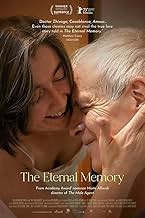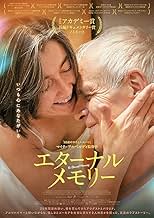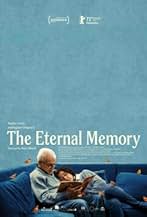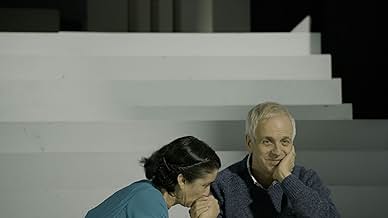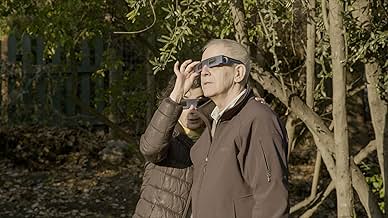NOTE IMDb
7,4/10
3,9 k
MA NOTE
Augusto et Paulina sont ensemble depuis 25 ans. Il y a huit ans, on lui a diagnostiqué la maladie d'Alzheimer. Tous deux redoutent le jour où il ne la reconnaîtra plus.Augusto et Paulina sont ensemble depuis 25 ans. Il y a huit ans, on lui a diagnostiqué la maladie d'Alzheimer. Tous deux redoutent le jour où il ne la reconnaîtra plus.Augusto et Paulina sont ensemble depuis 25 ans. Il y a huit ans, on lui a diagnostiqué la maladie d'Alzheimer. Tous deux redoutent le jour où il ne la reconnaîtra plus.
- Réalisation
- Scénario
- Casting principal
- Nommé pour 1 Oscar
- 14 victoires et 27 nominations au total
Gustavo Cerati
- Self
- (images d'archives)
Pedro Lemebel
- Self
- (images d'archives)
Javier Bardem
- Self
- (images d'archives)
- (non crédité)
Avis à la une
It's a documentary about a Chilean couple whose younger wife supports her husband, who has Alzheimer's.
Augusto Góngora was a prominent journalist and later cultural commentator on Chilean Public Television, beginning with the Pinochet years and following. He has two children; the documentary says nothing about his first wife. He has been in a relationship with actress Paulina Urrutia since 1997; they married in about 2017, several years after Góngora was diagnosed with Alzheimer's.
The documentary follows their interaction, especially during COVID-19, together with flashbacks to home movies and television clips from happier times when Góngora was practicing his profession. One of Góngora's post-Pinochet books reflected on cultural memories related to those difficult years. The documentary fashions a philosophical connection between the earlier cultural memory and the tragedy of Góngora's memory loss.
"The Eternal Memory" is a very personal movie. At first, I wondered if it was contrived reality TV, given the amiable manner in which the film initially portrays Góngora. But later, his confusion and increasing anxiety are plainly depicted. I'm not sure the memory linkage between Góngora's earlier professional life and later personal state is effective. But the film is gripping and is a challenging watch for people personally connected to someone with Alzheimer's Disease.
Augusto Góngora was a prominent journalist and later cultural commentator on Chilean Public Television, beginning with the Pinochet years and following. He has two children; the documentary says nothing about his first wife. He has been in a relationship with actress Paulina Urrutia since 1997; they married in about 2017, several years after Góngora was diagnosed with Alzheimer's.
The documentary follows their interaction, especially during COVID-19, together with flashbacks to home movies and television clips from happier times when Góngora was practicing his profession. One of Góngora's post-Pinochet books reflected on cultural memories related to those difficult years. The documentary fashions a philosophical connection between the earlier cultural memory and the tragedy of Góngora's memory loss.
"The Eternal Memory" is a very personal movie. At first, I wondered if it was contrived reality TV, given the amiable manner in which the film initially portrays Góngora. But later, his confusion and increasing anxiety are plainly depicted. I'm not sure the memory linkage between Góngora's earlier professional life and later personal state is effective. But the film is gripping and is a challenging watch for people personally connected to someone with Alzheimer's Disease.
Greetings again from the darkness. Augusto and Paulina are a real couple facing real challenges in the real world. Their challenges aren't related to where to head for dinner or whether Augusto will leave the toilet seat up or down. No, their daily challenges are whether Augusto will wake up and recognize his wife, or even know his own name. Chilean Documentarian Maite Alberti climbs inside this relationship to show us the real impact of Alzheimer's Disease, and does so expertly and intimately.
Augusto Gongora was a professional News Reporter/Journalist during the Pinochet regime, and Paulina Urrutia was a successful actor ... both well known in their country. We even see clips and archival newsreels of Augusto's work. However, filmed during COVID, almost the entirety of the film is focused on these two people taking each day as it comes ... the good days and the not-so-good days. And perhaps 'moments' is a better measure than days, as this cruel disease can shift quickly. Paulina handled much of the camera work so the director and crew could keep safe distance during the pandemic, and the result is a few blurry shots, none of which detract from what we are meant to see.
Paulina helps Augusto with his memory of work and kids. She helps him take a shower. She reads to him when they take walks, and she cringes as he rides a bicycle. She helps him with his eye protection as they view the eclipse. They even treasure the time they can dance together. There are many times they share a laugh, and there are times Paulina cries alone or Augusto appears lost. Mostly they have their tender moments which define the relationship that they so want to hold on to ... all while surrounded by Augusto's lifelong collection of books that fill the house - most of which he can no longer read.
Theirs is a love story. And it's real.
Augusto Gongora was a professional News Reporter/Journalist during the Pinochet regime, and Paulina Urrutia was a successful actor ... both well known in their country. We even see clips and archival newsreels of Augusto's work. However, filmed during COVID, almost the entirety of the film is focused on these two people taking each day as it comes ... the good days and the not-so-good days. And perhaps 'moments' is a better measure than days, as this cruel disease can shift quickly. Paulina handled much of the camera work so the director and crew could keep safe distance during the pandemic, and the result is a few blurry shots, none of which detract from what we are meant to see.
Paulina helps Augusto with his memory of work and kids. She helps him take a shower. She reads to him when they take walks, and she cringes as he rides a bicycle. She helps him with his eye protection as they view the eclipse. They even treasure the time they can dance together. There are many times they share a laugh, and there are times Paulina cries alone or Augusto appears lost. Mostly they have their tender moments which define the relationship that they so want to hold on to ... all while surrounded by Augusto's lifelong collection of books that fill the house - most of which he can no longer read.
Theirs is a love story. And it's real.
Absolutely captivating! I was so lost in the story that I had no idea how much time had gone by. The storytelling, as it moves from past to present, felt like an emotional symphony. Understanding Spanish made it so much more moving. Felt like watching The Notebook for the first time and in a documentary. A masterpiece that stirred my emotions like no other film in years.
Moreover, this documentary highlights the profound talent of women directors, showcasing their ability to craft narratives that resonate deeply. It's a testament to the need for more recognition for this exceptional contribution to the film industry. Deserves a much higher rating!
Moreover, this documentary highlights the profound talent of women directors, showcasing their ability to craft narratives that resonate deeply. It's a testament to the need for more recognition for this exceptional contribution to the film industry. Deserves a much higher rating!
In The Eternal Memory, there is a strong emotional charge from the first moment, which is maintained until the last seconds. This is the hook for the general audience, since emotionality is associated with relatable events. My biggest problem with this documentary is that the story loses its direction in monotony, falling into a plot dead end from which it cannot escape. It seems more like a video diary of the progression of one of the protagonists' illness, which also doesn't quite work, since there are inexplicable time jumps and events that remain unmentioned.
The documentary only relies on its high emotionality to attract an audience and there is nothing more to tell.
It's not completely flat and boring, but I would recommend other works alluding to the topic in question, such as the films Still Alice or The Father.
The documentary only relies on its high emotionality to attract an audience and there is nothing more to tell.
It's not completely flat and boring, but I would recommend other works alluding to the topic in question, such as the films Still Alice or The Father.
"The Eternal Memory" is a portrait of love, memory and identity as chronicled through the penultimate days of renowned Chilean journalist Augusto Gongora by his wife, the actress and politician Paulina Urrutia. It's a profound look at love and companionship and is also an enlightening study of the concepts of memory and identity... Whether that be of Gongora himself, who due to his Alzheimer's is losing his memory, or the work he dedicated his life to, that being the preservation of the collective Chilean memory and identity. It's a sad but tender documentary that is universal in its message and inclusive in its identity. It's a part of us, a part of humanity and a part of the future. Do check this out!
Le saviez-vous
- AnecdotesAugusto Góngora, used to be the host in the Chilean broadcasts of the Academy Awards. Now, the story of his struggle with Alzheimer's is nominated for the Academy award for best documentary feature.
- Citations
Augusto Góngora: I want to see my friends and something strange is happening here.
- ConnexionsFeatured in The Oscars (2024)
- Bandes originalesA Dónde Van
Written, composed and performed by Silvio Rodríguez
Meilleurs choix
Connectez-vous pour évaluer et suivre la liste de favoris afin de recevoir des recommandations personnalisées
- How long is The Eternal Memory?Alimenté par Alexa
Détails
Box-office
- Montant brut aux États-Unis et au Canada
- 67 594 $US
- Montant brut mondial
- 118 866 $US
- Durée
- 1h 25min(85 min)
- Couleur
- Mixage
- Rapport de forme
- 1.85 : 1
Contribuer à cette page
Suggérer une modification ou ajouter du contenu manquant

![Regarder Trailer[OV]](https://m.media-amazon.com/images/M/MV5BYzMzYTU5NTItNDYxZC00NzUzLWJjMTktZDg4YjkwNzY5ZmEwXkEyXkFqcGdeQXRyYW5zY29kZS13b3JrZmxvdw@@._V1_QL75_UX500_CR0)

